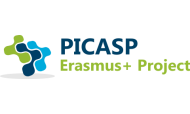PICASP Project Summary

With the conclusion of the PICASP project, we close a chapter filled with creative energy, unexpected challenges, and shared successes. From the very first days, we believed we were undertaking an initiative important not only for our own community but also for the broader worlds of culture, science, and innovation. A team of artists, researchers, educators, and technology specialists worked side by side, combining diverse competencies into a single, coherent whole.
Our activities began in a year marked by a global pandemic. We faced mobility restrictions, hampered international exchange, and the necessity of rapidly digitizing all processes. Adapting to remote work required us to develop new methods of communication and real‑time co‑creation, regardless of time zones or available tools.
Just as we began to regain freedom of action, the world was shaken by news of an armed conflict that directly affected some of our partners. In the face of this tragedy, the PICASP team activated additional psychological and logistical support mechanisms and adapted the schedule to new realities, prioritizing safety and solidarity. These experiences strengthened our determination and demonstrated how vital flexibility is when managing complex undertakings.
Although we are formally closing PICASP, we see it more as a starting point than a final conclusion. The digital infrastructure developed, the models of cooperation we have created, and the experience gained in crisis management will now serve as a foundation for future ventures. We believe that the knowledge acquired during the project will help other teams respond more effectively to an ever‑changing reality.
PICASP would not have been possible without the energy and commitment of many individuals—from coordinators, researchers, teachers, and students to volunteers and workshop participants. Each of you made a unique contribution to shaping the project and enriching its results. We thank our institutional partners for their trust and openness, and the local communities for their inspiration and hospitality.
We hope that the publication we are presenting to you will be not only a chronicle of past activities.
Vol. 1: https://www.academia.edu/128743296/VOLUME_I_PICASP_Projects_methodologies_and_Cultural_Heritage
Vol. 2: https://www.academia.edu/128743241/Archaeological_heritage_in_Caspian_Area
Vol. 3: https://www.academia.edu/128743183/PICASP_Project_Volume_3
